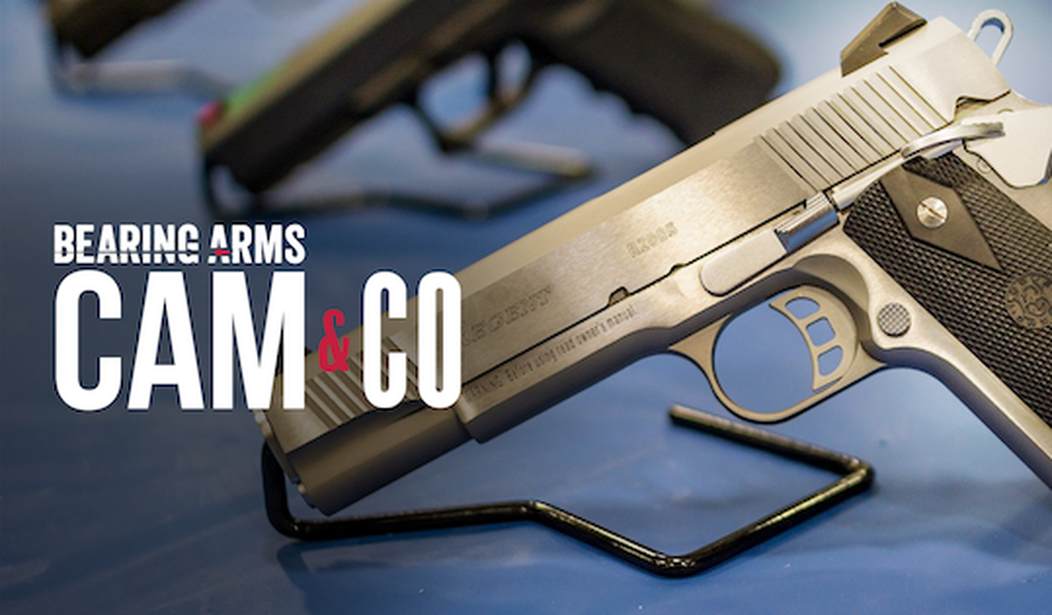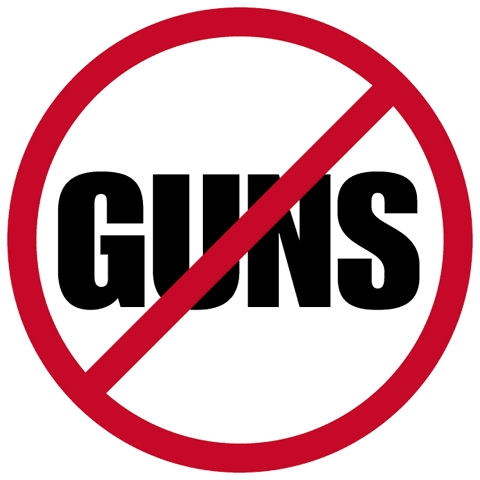New ATF Rule Aimed at Private Sales, Not ‘Gun Show Loophole’

On today’s Bearing Arms Cam & Co, The Reload founder Stephen Gutowski joins me to break down what the new rule is all about, as well as countering the spin from the likes of Attorney General Merrick Garland, who is among those repeating the “gun show loophole” lie.
“Under this regulation, it will not matter if guns are sold on the internet, at a gun show, or at a brick-and-mortar store: if you sell guns predominantly to earn a profit, you must be licensed, and you must conduct background checks,” said Attorney General Merrick B. Garland. “This regulation is a historic step in the Justice Department’s fight against gun violence. It will save lives.”
As Gutowski says, the same rules for gun sales already apply whether that sale takes place at a brick-and-mortar location, a gun show, online, or anywhere else. There is no loophole allowing gun dealers to bypass background checks for purchasers because they’re doing business at a gun show, even though there are plenty of media outlets like POLITICO who are mindlessly parroting Garland’s claims.
The final rule, expected to be submitted Thursday to the Federal Register by the Bureau of Alcohol, Tobacco and Firearms, would eliminate a loophole that has allowed sales of guns without background checks of guns outside of brick-and-mortar stores.
Again, that’s not even close to being accurate. Private sales, no matter where they take place, are not subject to background checks. Commercial sales are, no matter where they happen.
What’s changing with the ATF’s new rule is who is defined as being “engaged in the business,” and Gutowski says one of the big problems with the new rule is that there isn’t a clear definition.
“To me it seems like more of an attempt to cast a cloud over people selling used guns, to make them think they need a license even if it’s not entirely clear they do. Which is unfortunately not an uncommon thing for the ATF to do at the moment,” Gutowski says.
“The goal here is to have more used sales go through background checks,” he added. “That’s what they want. They want all sales to go through background checks, but they can’t do that under current law so they’re trying to get as close as they possibly can by either forcing people to get licenses or making people who are selling their used guns think they might need a license.”
How do you know if you need an FFL? You don’t. The proposed rule is full of vague and fuzzy language like this:
However, there is no minimum threshold number of firearms purchased or sold that triggers the licensing requirement. Similarly, there is no minimum number of transactions that determines whether a person is “engaged in the business” ofdealing in firearms. For example, even a single firearm transaction or offer to engage in a transaction, when combined with other evidence (e.g., where a person represents to others a willingness to acquire more firearms for resale or offers more firearms for sale), may require a license.
“May,” not “shall.” Even offering a single gun for sale could result in the ATF determining you’re “engaged in the business,” regardless of whether that sale is completed.
The new rule could lead to an influx of FFL applications, which, according to the National Shooting Sports Foundation, will result in a host of issues going forward:
Adoption of the rule would frighten untold numbers of collectors and other persons not actually engaged in the business to obtain licenses, create untold numbers of licensees (who could then obtain firearms at wholesale), divert ATF resources away from licensee inspections and industry service and compliance, distract ATF from bona fide criminal investigations, and harm both the legitimate firearm industry and ATF operations.
According to the Office of Management and Budget (OMB), the Proposed Rule isconsidered a significant regulatory action and as such, is required to go through a regulatoryimpact process. The private and administrative costs estimated by the ATF are significantly understated. The rule would cost private citizens about $338 to obtain a new license, and $35 to $194 annually to maintain the license. Additionally, this new rule would cost the government $116 million to process new licenses. See the Memorandum “Proposed ATF Licensing Rule”from John Dunham and Associates dated October 26, 2023, which is attached at the end of this letter.
As NSSF noted in its public comment to the proposed rule, one of the reasons why Congress decided to try to define who was “engaged in the business” back in the 1980s with the Firearms Owners Protection Act was the complaint that there were too many FFLs for the ATF to keep track of:
In 1984, the Senate Judiciary Committee noted witness testimony showing “the urgent need for changes in current law to prevent the recurrence of abuses documented in detail.”It explained: “Many firearm hobbyists sell or trade firearms from their collections, and hearings have repeatedly established that many such hobbyists have been charged and convicted fortechnically violating the broad reading which courts had given this phrase.” One of those vague tests applied to “anyone who ‘has guns on hand’ or can obtain them and is willing to sell ….” The FOPA bill “would substantially narrow these broad parameters by requiring that the personundertake such activities as part of a ‘regular course of trade or business with the principal objective of livelihood and profit.’”
In debate in the Senate in 1985, Sen. Abhnor noted “tremendous confusion over who should possess a FFL license ….” According to Sen. Laxalt, “Current law is ambiguous in its requirements, ensnaring many people who have neither the desire nor the intent to violate the law.” Sen. Hatch, the bill’s floor manager, noted “a hodgepodge of definitional interpretations found in court rulings” which “has led to many collectors being convicted for just a few sales which were made during the regular and normal course of their collecting or hobby activities.”
FOPA was debated in the House in 1986. Rep. Volkmer, chief sponsor of the bill, detailed specific cases of abuse. R.C. Lindsey, a witness in one of the hearings, had a license: “BATF sought to revoke it, not upon the grounds that he had ever done wrong, but on the grounds that he was not selling enough guns to merit the license. He had sold three, at a time when the Bureau was prosecuting unlicensed persons selling three or four guns for dealing without a license.” By contrast, Patrick Mulcahey was arrested for dealing without a license “after he sold three firearms from his personal collection over the period of 1 year.”
In response to comments about the large number of licensees, Rep. Marlenee asked, “Has anybody ever thought that perhaps the reason that we have 225,000 licensed gun dealers is because of the harassment of the BATF and the requirements that are placed on them? … You cannot clean a gun hardly without having a license.”
That comment seems eerily similar to what will be the effect of the rule that is now proposed. Before FOPA, some complained that there were too many dealers, and that many whowere not really engaged in the business obtained licenses just so they could purchase firearms at wholesale for personal use. But many collectors who were not engaged in the business obtained licenses out of fear of being prosecuted for engaging in the business. The Proposed Rule will reinstate the pre-FOPA regime.
Rather than providing gun owners (and gun sellers) with a clear and understandable definition of who is “engaged in the business” of dealing firearms, the ATF is promulgating this incredibly vague rule; not to close a non-existent loophole, but to force as many private sales as possible to go through a background check. If that means that some gun owners end up being charged with federal felonies for offering a single gun for sale, the Biden administration is just fine with that outcome. And if the ATF is flooded with applications from gun owners who decide it’s safer for them to get their federal firearms license, it won’t be long before the gun control lobby uses that to call for a dramatic increase in agency funding, and crackdown on who is eligible to obtain an FFL or both.
The legacy media isn’t interested in covering any of the inherent problems with the ATF’s latest rule, of course. Most reporters don’t have a clue about current gun laws, but even if they were knowledgeable about this issue, they’re too busy promoting the administration’s fictions to concern themselves with the facts. It’s so important to have independent, pro-2A voices like The Reload and Bearing Arms to deliver the truth the anti-gun politicians don’t want you to hear, and we can use your help.
Use the promo code SAVEAMERICA when you sign up for a VIP or VIP Gold membership at Bearing Arms and you’ll not only get significant savings on your membership, but you’ll get exclusive commentary and analysis about the growing threats to our Second Amendment rights; ensuring that you’re informed when it comes to the challenges facing gun owners today. We can’t do our job without the support of 2A defenders like yourself, and it’s more important than ever that there are voices ready to challenge the gun control lobby’s lies with a daily dose of the truth.
